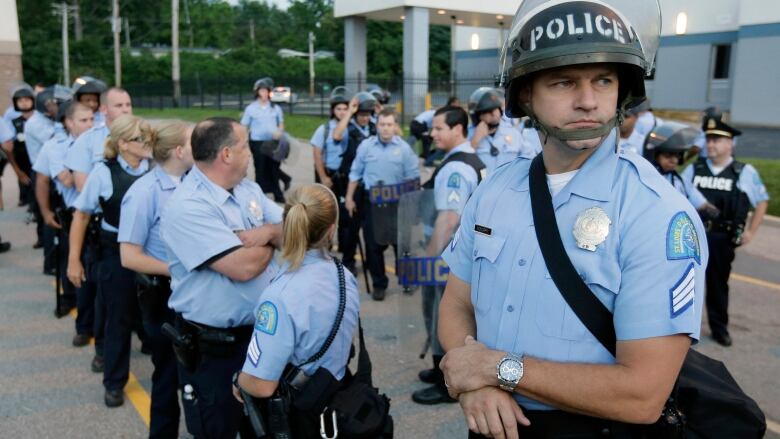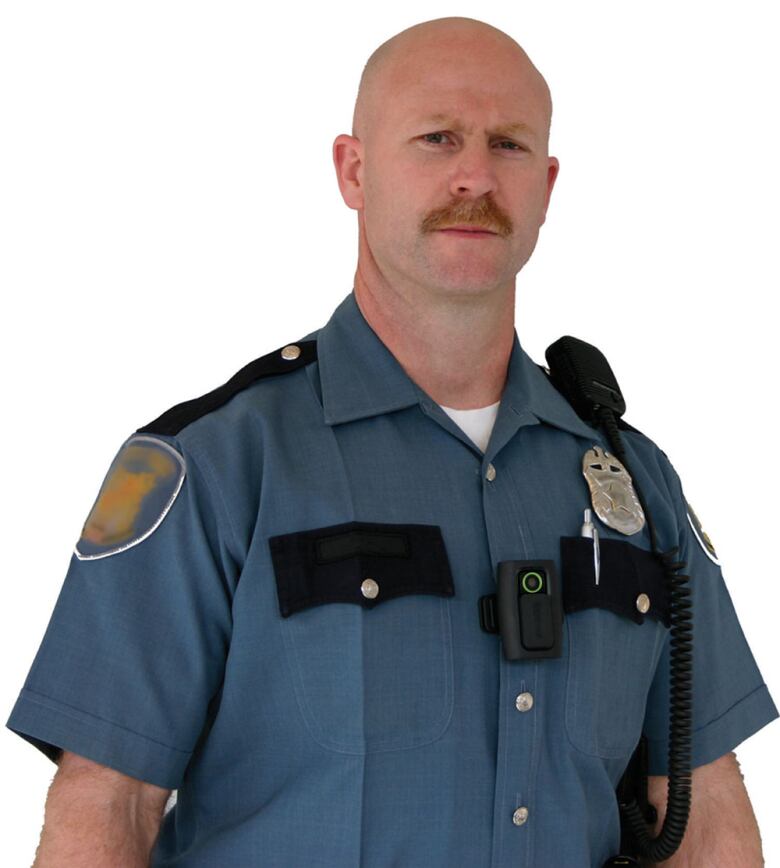Wearable camera companies stand to profit from Ferguson
Taser International Inc., VieVu, body camera makers, are getting lots of calls about products

Any notion that his company stands to profit from the fatal shooting of Michael Brown makes Steve Tuttle "cringe," he says, but it's true that Taser International Inc., and other manufacturers of body-worn cameras for policeare seeing heightened interest in their products.
"Our inquiries are increasing like crazy, our hits to our website have multiplied. There is tremendous interest in this," Tuttle, senior vicepresident of strategic communications, said in an interview. The company perhaps best known for the hand-held Taser device that acts like a stun gun, expanded into the business of smallwearable cameras for officers in 2008.
That portion of the business was already picking up before the events in Ferguson, Mo.,when a police officer shot Brown on Aug. 9 and riots in the streets followed in the days after. Now, the company is getting even more attention in its products, according to Tuttle.
What transpired between the officer Darren Wilson and Brown that day isn't clear and while there are cellphone videos of the scene from witnesses after the shooting, there is no video from the police vehicle or from the perspectives of the two individuals involved. Questions are being raised as a result about officers being equipped with body cameras, and to a lesser extent, Taser devices.

Police departments that had rejected the idea of officers wearing cameras last year are now calling Taser back and expressing an interest, he said. Some are realizing that what happened in Ferguson could have happened to them, Tuttle said.
"I think that's the wake-up call here. Technology is here and we are at yet another paradigm shift for our company," he said about the changing nature of the business.
Taser stock price up
Taser's stock price has gone up since Aug. 9 but Tuttle said his company is not looking to take advantage of what happened in Ferguson.
"We're not going to be an ambulance chaser here," he said. "We will let law enforcement settle down. They will reach out to us, I'm very confident they will, and we'll be there when they need us."
There are plenty of other police forces that have been buying their wares, in the meantime, and Taser isn't jumping on some bandwagon, Tuttle said, pointing out they've been working on this for years.
"When someone says this is all about profit, we're in business, absolutely, but we came up with this idea in 2008," said Tuttle.
At least 1,200 law enforcement agencies in the U.S. bought cameras from Taser and 80 per cent of those sales were in the last 12 months. It's a growing business and Taser has been reaping the rewards. Its profits from the cameras and supporting software skyrocketed from about $1 million to$2 million in early 2013 to nearly $11.5 million in the last quarter.
Cost is a prohibiting factor for some police agencies, but companies that sell bodyworn cameras advise that their many benefits outweigh the expense. They reduce the number of complaints and litigation cases against police, which are costly to investigate, decrease the use of force, and enhance public trust, the companies say when trying to sell their products.
"How can you not have this technology? You can't afford not to have it," said Tuttle.
Steve Lovell, chief executive of VieVu, another big manufacturer of the cameras, said his company offers a monthly payment program so police agencies don't have to pay up front for the cameras. The Seattle-based company's products are used by about 4,000 law enforcement agencies in 16 countries and it says it owns 80 per cent of the U.S. market.
Like Taser, VieVu was busy before Aug. 9, but Lovell said in the last 10 days interest in its products has gone up. Website traffic is "explosive" and requests for free trials are up 70 per cent he said.
Company reached out to Ferguson
"Cashing in, it's something we've been working on doing and I hate to see success through this type of process but I think it was already occurring prior to Ferguson," Lovell said.
A VieVu sales representative has reached out to the Ferguson police department, the chief executive said, and the company is ready to support them in any way they can.
Lovell, a former police officer in California, said VieVu's goal from the outset has been to educate the market on why it's so important for police to wear cameras.
"It is just a good thing for an officer in today's times to record video of their encounters with the public and of their investigations for court because at the end of the day, you're bringing the jury into the crime scene and absent the video you have just a written police report," he said.
What happened in Ferguson will likely increase pressure on police forces to consider adding cameras to their uniforms, if they weren't already thinking about it. Technology is changing how police go about their jobs and that's a concept law enforcement is starting to understand, the companies say.
"I do feel that this is going to be standard equipment on a police uniform," Lovell said about the body cameras.












_(720p).jpg)


 OFFICIAL HD MUSIC VIDEO.jpg)
.jpg)



























































































